- Home
- Jane Smiley
Ordinary Love and Good Will Page 6
Ordinary Love and Good Will Read online
Page 6
I look toward the house. Long shafts of light blaze up the yellow siding, casting the black shadows of the chestnut trees against the porch; the screen door swings slowly on its hinges; squirrels jump from roof to tree limb then run headlong at the ground. The dew evaporates in the rising sun. Right now they are safe here, in my house, taking, as they think, care of me. Isn’t that a picture to set beside the other one, a picture of survival next to a picture of betrayal? Don’t they cancel each other out? My pleasure in this morning, this ordinary beauty, prods me to think they do.
It must be about eight-thirty when Joe comes down, dressed, Bertrand Russell in his hand. As always, he goes straight to the coffee machine, prepares and downs his first half-cup, smacks his lips over it. “Hi, Mom,” he says, affectionately.
“Hi, sweetie.”
“Didn’t get in too late, Mom.”
“Did you have a good time?”
“Okay, I guess. Yeah, it was okay.” He stirs his coffee, resting his head in his hand. Oh, he is so moody. He says, “I don’t think Michael had a very good time. I feel responsible for that.”
“Why?”
“Well, going out was my idea. It’s no big deal.” He picks up the shredded-wheat box and pours some into his bowl. I put the milk on the table, then go back to pouring cake batter into the layer tins.
“I mean,” Joe goes on, “he sounds like he has tuberculosis or something. You should hear him up in the bathroom. I’ve never heard such coughing and throat-clearing in my whole life. I peeked in. I could swear I saw him inhale water out of his hands into his nose and then spit it into the sink. Mom, I don’t think I know this guy.”
“He does seem to be coughing a lot.”
“Last night the pianist was having a break, and Barbara started talking about her dog-training class, and it was pretty funny, and Kevin and I were laughing—you know how Barbara tells a story; she can make growing tomatoes on her front porch sound like a three-ring circus. Anyway, Kevin and I were cracking up, and I looked over at Michael and he was smiling, I mean, his smile was at the table but he wasn’t. And right when I was watching, he got farther away, like he couldn’t bear us or something. And I caught myself thinking, Training dogs? Children are starving! All that crap.”
“He must be pretty tired.”
“You’re right. I’m sorry.” He gets up and pours himself another cup of coffee. A few minutes later, Michael comes in, dressed in jeans and a shirt, barefoot. “Hi, Mom,” he says, warmly.
“Sleep?” I say.
“Pretty good, for a mere eight hours.” He sets a large round pink object on the table beside his plate. Joe looks at it, too. We exchange a glance. Michael runs himself a glass of water, then sits down and puts this pink object in his mouth. With some water and a visible gulp, he swallows it. Joe says, “Good Lord, what’s that?” I put the cakes in the oven.
“Chloroquine. Quinine. Malaria, you know.”
“You have malaria?”
“Maybe. At any rate, I have to take this pill every Sunday. ‘Instead of church’—that’s what the Indian doctors always say.”
“What are you taking for the tuberculosis?”
“Tuberculosis?”
“All that coughing and throat-clearing in the bathroom.”
“Oh. What? Oh, that. That’s just a habit. India is so dusty that your throat gets hypersensitive to phlegm. It goes away, I hear. Hey, Joe. Don’t worry about me, all right?”
“How about this. I won’t talk about it.”
“Mom can worry about me. She owes me for all those letters she didn’t write. Shit, I am so jet-lagged.”
“You should have said something before we went out last night.”
“Why?”
“You didn’t seem to have a good time.”
“I didn’t have a good time, but I had a good enough time. I’m glad we went out. Barbara and Kevin seem happy with each other.”
“It was a nice wedding,” I say.
“I would like that, I think,” says Michael, “being married to somebody I’d known since seventh grade. Or maybe falling in love with someone in seventh grade, and then having her grow up pretty, and shorter than me, and smart, and funny, too. You’d never have to fall in love again. In India you don’t have to fall in love at all.” Two bowls of shredded wheat, a hard-boiled egg, two pieces of toast, a glass of orange juice. He pushes himself away from the table. “Show me the lawnmower.” Joe follows him out.
I suppose it is still my privilege to rummage in their rooms for dirty clothes, but I must say that I pause before doing it. Joe has left some shirts and underwear by the door of his room, and I pick up those, but when I go into Michael’s room, I don’t know where to begin. The bags he has brought—a knapsack and a duffel—have been emptied on the carpeting, a swath of unfamiliar, filmy items, all crumpled. There is a small pile of what look like tiny cigars, each tied with a red thread. There are pairs of sandals, some colorful pictures on parchmentlike paper, some books, a pile of blue air letters. The visible ones carry Joe’s handwriting. I go to the window and open it, intending to ask what I can wash, and I see them in the driveway in front of the garage, squatting over the lawnmower. The tools are arranged in a neat row behind them. As I watch, Joe lifts out the motor and they turn. Joe puts it down on a piece of newspaper, and they stare at it for a long time. Finally, Michael points at something, and a moment later, Joe chooses a tool and applies it to the motor. After that, it is beguiling to watch how they cooperate, with nods and exchanged glances and passing of tools and laughter. I turn and leave Michael’s room, stepping over the clothes.
Simon Elliott was like that, handy with tools. This house is full of his work—new wiring, new chimney, floors refinished, new shower upstairs, bookshelves built into the dining-room walls. I didn’t let him do as much as he wanted to—barnboard siding in the basement, tiling around the fireplace, downstairs bathroom. His own house was the kind of project they write about in magazines, where someone buys a place with no floors, missing walls, no banisters, a hole where the toilet should be, a laundry sink as the only appliance in the kitchen. I think that inside that house he was utterly happy, because he was surrounded by his project. And he didn’t throw himself into it, either. It took him a year to get the floor down between the basement and the first floor. He was a patient man. I don’t know that my children ever really liked him. He must have seemed much duller to them than their father. He wasn’t talkative and didn’t smile very often, although, when he did, I found his smile merry and disarming. He didn’t read much, didn’t talk about the nature of anything—the brain, life, the ways of the world. And he was moody, too. Simon was the kind of man who would have been a good husband in the eyes of my father and uncles—good job, practical intelligence—and in the eyes of my mother and aunts—keeps out of the way, gives the wife a fairly free hand. Well, I might have married him, but he never thought he deserved me enough to ask. And I let the moment pass.
At eleven-thirty, when I am moving on to the editorial section of the Sunday paper, dreading a little the mishmash of misinformation and strong opinion that I will find there about the Naval Weapons Support Center, Joe comes in and says, “Hey, guess what’s left this time!” He holds out his hand, closed.
“What?”
He opens his hand. “Nothing! And we didn’t lose anything, either. Come on out.”
The sun is hot already, and my sneakers stick a little to the asphalt of the driveway. Michael is filling the tank with gasoline. He stands back, puts down the can, hands the pull cord to Joe, saying, “After you, Oliver.”
“Be my guest, Stanley.”
“Age before beauty, Ollie.”
“Stanley!”
“Yes, Ollie?”
“Pull the fucking cord!”
We laugh. Michael pulls the cord. Noise bursts out of the lawnmower, and Michael gestures toward the handle, shouting, “After you, Oliver!”
At lunch they are still at it, though by now Michael is the
Lone Ranger and Joe is Tonto. I remember this particular dialogue, because they developed it years ago. They switch off roles, and sometimes one of them is Silver, the horse. When they were fourteen and both living with me, they went for two weeks with Michael as Tonto and Joe as Silver, arguing about whether the Lone Ranger was primarily racist or primarily “human-ist.” I put bowls of soup in front of them, and Michael says, in a deep, pompous voice, “Fine soup, ma’am. Back in that box canyon up Cheyenne way, we were reduced to eating our shoes.”
“Shoe taste good to red man.”
“Tonto here caught some lizards for our delectation, though.”
Joe makes a face at me behind his hand. “Lizard taste good to white man. Red man not like tickle going down.”
“What was that, faithful sidekick?”
“Was, ‘fuck you,’ Kemosabe.”
“Why, certainly, my good man.”
It occurs to me that, with enough repairs, comic routines, and information about sports and music, Michael and Joe might come together in peace.
Joe gets up for another cup of coffee, and starts rummaging in the refrigerator. In this interim Michael puts down his fork and rubs his face in his hands, yawning. It is easy to forget what he has to recover from. I have already gotten used to his appearance, and other new habits—waggling his head when he means to nod “yes” and stooping because he has spent so much time talking to short people—slide in and out of his manner, reminding but not convincing me to change my expectations of him. I don’t think Joe is even reminded, because Michael is careful to be his old self around his twin. Or maybe Joe brings that out in him. At any rate, he is back to being perky and ironic when Joe sits down again. “Hey, Mom,” Joe says. “Guess what.”
“What?”
“Kevin has a new job. He’s actually an administrative assistant to the state Republican central committee. Can you believe it?”
“I thought he was just working at a temp job researching in the legislative library.”
“He WAS. He got that through Manpower. But that was a year ago. Now he’s moved up through the ranks.”
“That’s nice,” I say.
“Well,” says Joe, “I don’t think it’s NICE. I think it’s weird. And he’s been working at this job for four months and he hasn’t dared to tell me before this. I think it’s base and corrupt.”
Michael cocks his head and looks at Joe. I say, “Well—”
“I mean, this is the guy who spray-painted WE ARE VICTORIOUS, U.S. OUT OF VIETNAM, APRIL 23 on the wall of the gymnasium when he was a freshman in high school.”
“Was that Kevin?”
“Now you’re the only one who knows besides us.”
I open my mouth.
“We didn’t help,” says Michael.
“But we destroyed the paint cans. God, remember that? They all said, Do not puncture or incinerate. I thought they might explode or something. We wore these gloves so we wouldn’t get our fingerprints on them. He used to call himself ‘the senator’ because it was subversive. Now I think he means it. The Republican party, Jesus.”
Michael says, “I admire the way he went out and did it, instead of studying it, you know? I mean, most of these old lefties just end up going to graduate school in political science or something. I think he’ll ending up actually knowing something.”
“I think he’ll end up actually knowing nothing.” Joe’s voice is tight. “Knowing less than nothing—knowing something wrong and thinking it’s right.”
Michael is casual but disbelieving. “Contaminated just by brushing against a few Republicans?”
“Assisting in smoky rooms is not just brushing against. It’s being paid, what, fifteen, eighteen thousand? Blood money.”
I say, “Wasn’t it the Democrats who gathered in all the smoky rooms?”
“Bullshit.” Michael’s tone is harsh suddenly.
Joe is startled. He sits back in his chair, panting a little, staring at Michael. Michael pushes the hair off his forehead. “You know what blood money is? I saw what it is in India. It’s when somebody is caught for hoarding food in a town that’s starving to death, and he pays a little bribe, and gets to keep what he’s got and get more, and the people actually starve to death. It’s when the police are paid to look the other way when some people decide to go and teach some Sikhs a lesson by burning them up in their houses. I don’t think working for the Republican party qualifies Kevin for the lowest circle of political hell by any means.”
“Okay, how is Kevin going to be any different in twenty years from those Union Carbide guys who were all over the media, making apologies and excuses about the Bhopal thing? You must have seen them.”
“What’s this all about? I don’t see the connection. It’s just a crummy job in state government is all. I don’t think you’re being very logical, frankly.” He tips his chair back. He is being very cool.
Joe is not. “I’m always logical, actually. It’s you that can’t see the connection, but the connection is there, all right. Do you think those guys knowingly speak lies? Of course not. They wouldn’t be effective that way. They actually believe what they are saying, about the good intentions of the company, and the deep sorrow that the CEO feels about the tragedy. The company makes them that way, by bringing them in and training them.”
“The CEO probably is sorry.”
“He’s scared shitless that his insurance rates are going to go through the ceiling is what he is.”
“What are we arguing about?”
Joe is sweating. Michael is, too, a little. Joe says, “There’s nothing wrong with graduate school.”
Michael shrugs. They sit silently, not looking at each other. Finally, Joe jumps up and says, “I’m going to cut the back now,” and bangs out of the house. After a moment I say to Michael, “Want anything else?”
“No. Yes. A glass of water. I’ll get it.” But he continues to sit, only tipping his chair forward. He says, “Hey, Mom. Get this. I didn’t even realize we were arguing until almost the end. I couldn’t see it. I couldn’t see him. He was mad, wasn’t he?”
“Almost from the beginning, I’d say.”
“Ma, I haven’t been mad in two years. I don’t know what it feels like, looks like, except when I see it on the street in India, people beating on each other, yelling at each other. I forgot how mad he gets. I mean, during that I suddenly saw him carrying this big weight toward me, something unbearably heavy that he was going to put right in my lap.”
I don’t say anything. He draws himself a glass of water, clears his throat, coughs, sniffs, sighs, puts the glass, then his head, on the counter. He says, “Ma, I could sleep for six days.”
“So take a nap.”
“Okay.” And he weaves out, as if drained of strength. I begin frosting the cake, green, because there’s nothing Diane likes better than a chocolate cake with green icing. As I put the cake in the refrigerator, the noise of the lawnmower dies, and a second or so later, Joe throws back the screen door. I think of what I might say—I need to go to the bathroom, the store, K-mart, next door, anywhere, right now. Let me evade the coming confidences. It is a physical urge, a shrinking—not from Joe himself but from what I will become in the next fifteen minutes—reassuring, objective, soothing, fat somehow. It is a way I have always been with Joe more than the others. Each of them has approached me with a different request—Ellen’s has always been, “What is true?” and to the best of my ability I have always been relieved to tell her. Daniel’s has always been, “Is it okay if I do this?” and I have always been able to say “yes” or “no.” And his response has always been that he was going to do it anyway. Annie’s every look and gesture says, “Can you see me yet?” and so she is flamboyant and prickly and hilariously funny. Michael has had the simplest request, directed only at me, and that has been, “Do you love me best?” and my answer, directed only at him, has been, “I can’t.” We know where we stand.
But Joe, Joe’s question is directed everywhere, and it is
unanswerable. It is, “Am I okay? Tell me that I am just okay, and that is enough for me.” He is okay. He is smart and thoughtful and nice-looking. He is doing well in a prestigious program at a good school. When he wants a date or a girlfriend, he can get one. “You are okay,” I say. “You have to say that, you’re my mom,” he says, or, I imagine, “you’re my girlfriend, you’re my major adviser, you’re my friend.” Nothing can induce him to believe that he is okay. How did I overlook him when he was a baby? I remember praising, hugging, paying attention, taking delight. Were there simply too many? But we thought we were doing them a favor, giving them lots of others besides ourselves to learn from and get close to. Pat had six brothers and sisters, and spoke rapturously of the family fun-fair, of the delight he took in listening to his mother address him as “Tim-Jackie-Joe-Jimmy-PATRICK!”, as if he shared in all the qualities that he adored in his older brothers. I thought my aunts and uncles, who spoke fondly of their adventures on the farm as children, had had a much more exciting time than I was having by myself. Old justifications. Five kids in five years is a lot of kids. Nobody would approve today. In 1963, when Ellen pushed a grocery cart with one twin in it and I pushed the other and Daniel and Annie trailed behind, everyone smiled at us. Fifty 1963 dollars handed over at the checkout stand? A figure to be proud of.

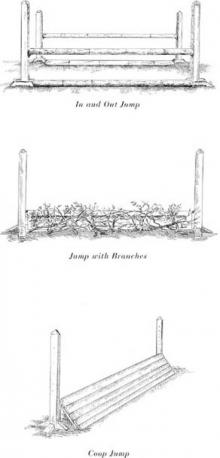 The Georges and the Jewels
The Georges and the Jewels Pie in the Sky: Book Four of the Horses of Oak Valley Ranch
Pie in the Sky: Book Four of the Horses of Oak Valley Ranch Duplicate Keys
Duplicate Keys Charles Dickens
Charles Dickens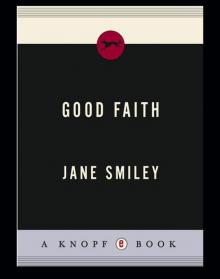 Good Faith
Good Faith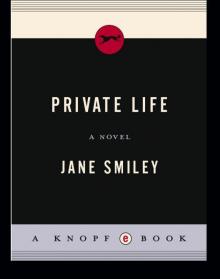 Private Life
Private Life A Thousand Acres: A Novel
A Thousand Acres: A Novel The Greenlanders
The Greenlanders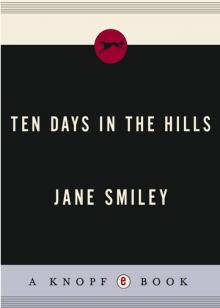 Ten Days in the Hills
Ten Days in the Hills Gee Whiz: Book Five of the Horses of Oak Valley Ranch
Gee Whiz: Book Five of the Horses of Oak Valley Ranch A Thousand Acres
A Thousand Acres The All-True Travels and Adventures of Lidie Newton
The All-True Travels and Adventures of Lidie Newton Ordinary Love and Good Will
Ordinary Love and Good Will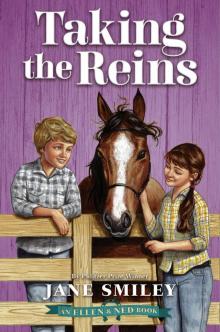 Taking the Reins (An Ellen & Ned Book)
Taking the Reins (An Ellen & Ned Book) The Man Who Invented the Computer
The Man Who Invented the Computer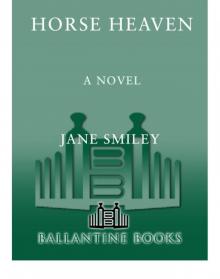 Horse Heaven
Horse Heaven The Age of Grief
The Age of Grief Riding Lessons
Riding Lessons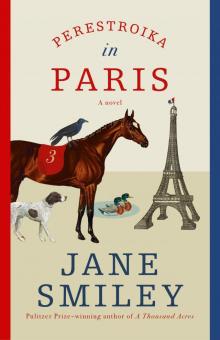 Perestroika in Paris
Perestroika in Paris A Good Horse: Book Two of the Horses of Oak Valley Ranch
A Good Horse: Book Two of the Horses of Oak Valley Ranch Saddles & Secrets (An Ellen & Ned Book)
Saddles & Secrets (An Ellen & Ned Book)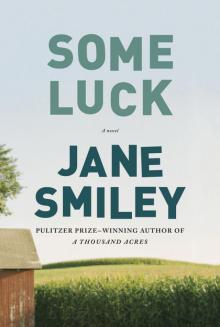 Some Luck: A Novel
Some Luck: A Novel Champion Horse
Champion Horse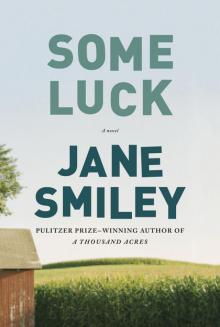 Some Luck
Some Luck Gee Whiz
Gee Whiz Barn Blind
Barn Blind A Thousand Acres (1992 Pulitzer Prize)
A Thousand Acres (1992 Pulitzer Prize) Pie in the Sky
Pie in the Sky True Blue
True Blue A Thousand Acres_A Novel
A Thousand Acres_A Novel A Good Horse
A Good Horse